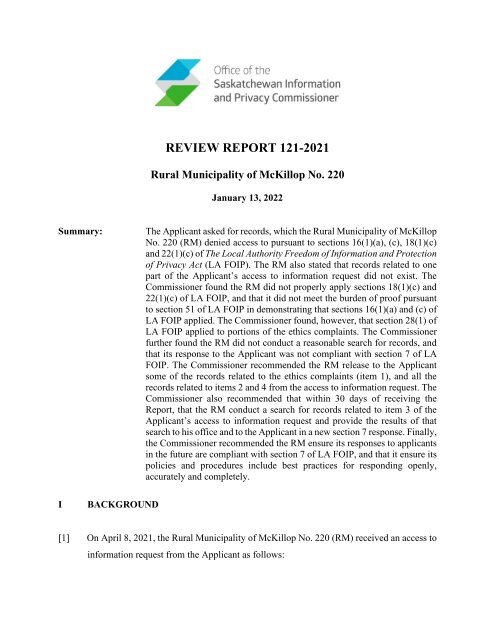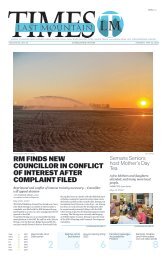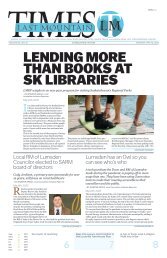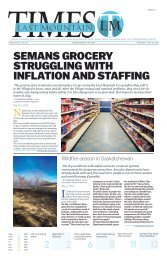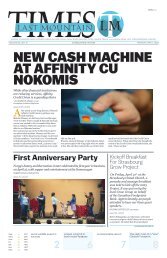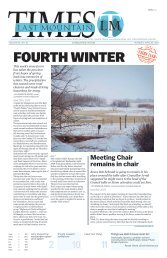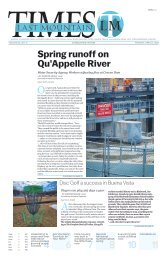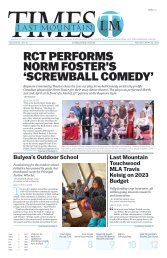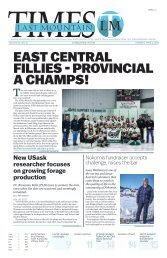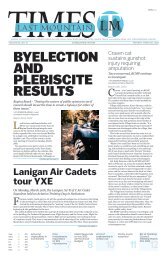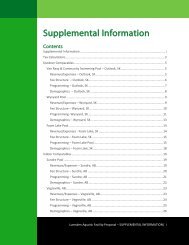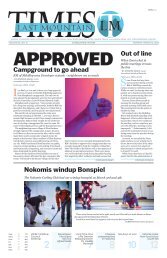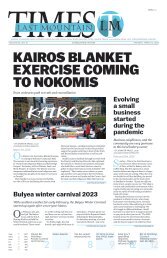OIPC Review Report - Part 1
You also want an ePaper? Increase the reach of your titles
YUMPU automatically turns print PDFs into web optimized ePapers that Google loves.
REVIEW REPORT 121-2021<br />
Rural Municipality of McKillop No. 220<br />
January 13, 2022<br />
Summary:<br />
The Applicant asked for records, which the Rural Municipality of McKillop<br />
No. 220 (RM) denied access to pursuant to sections 16(1)(a), (c), 18(1)(c)<br />
and 22(1)(c) of The Local Authority Freedom of Information and Protection<br />
of Privacy Act (LA FOIP). The RM also stated that records related to one<br />
part of the Applicant’s access to information request did not exist. The<br />
Commissioner found the RM did not properly apply sections 18(1)(c) and<br />
22(1)(c) of LA FOIP, and that it did not meet the burden of proof pursuant<br />
to section 51 of LA FOIP in demonstrating that sections 16(1)(a) and (c) of<br />
LA FOIP applied. The Commissioner found, however, that section 28(1) of<br />
LA FOIP applied to portions of the ethics complaints. The Commissioner<br />
further found the RM did not conduct a reasonable search for records, and<br />
that its response to the Applicant was not compliant with section 7 of LA<br />
FOIP. The Commissioner recommended the RM release to the Applicant<br />
some of the records related to the ethics complaints (item 1), and all the<br />
records related to items 2 and 4 from the access to information request. The<br />
Commissioner also recommended that within 30 days of receiving the<br />
<strong>Report</strong>, that the RM conduct a search for records related to item 3 of the<br />
Applicant’s access to information request and provide the results of that<br />
search to his office and to the Applicant in a new section 7 response. Finally,<br />
the Commissioner recommended the RM ensure its responses to applicants<br />
in the future are compliant with section 7 of LA FOIP, and that it ensure its<br />
policies and procedures include best practices for responding openly,<br />
accurately and completely.<br />
I<br />
BACKGROUND<br />
[1] On April 8, 2021, the Rural Municipality of McKillop No. 220 (RM) received an access to<br />
information request from the Applicant as follows:
REVIEW REPORT 121-2021<br />
1) Ethics and Conflict of Interest Complaints filed against any Councillor since January<br />
2018 and decisions on those complaints<br />
2) Applications submitted to the RM from Glamping/Northshore Development since<br />
January 2020<br />
3) Quotes received by the RM since January 2020 for Livestreaming<br />
4) Document discussed at Feb 23 council meeting when deciding to hire a RM soliciter<br />
[sic].<br />
[2] On May 3, 2021, the RM responded to the Applicant as follows:<br />
The RM of McKillop No. 220 received your Access to Information Request Form on<br />
April 8, 2021 and offers the following in response to your inquiry:<br />
1. Code of Ethic Complaints are considered private information because of the way<br />
they are handled. Decisions are public and are available in the meeting minutes.<br />
Meeting minutes are published on our website.<br />
2. Development Permit Applications submitted by Glamping Resorts to the RM since<br />
January 2020 are exempted under <strong>Part</strong> III of the Local Authority Freedom of<br />
Information and Protection of Privacy Act.<br />
3. No written quotes were received by the RM since January 2020 for Livestreaming.<br />
4. <strong>Report</strong> to Council on hiring an RM Solicitor is exempted under <strong>Part</strong> III of the Local<br />
Authority Freedom of Information and Protection of Privacy Act.<br />
[3] On May 3, 2021, the Applicant asked my office to review the RM’s decision.<br />
[4] On May 4, 2021, my office asked the RM to clearly state, pursuant to section 7 of The<br />
Local Authority Freedom of Information and Protection of Privacy Act (LA FOIP), on<br />
which provisions of LA FOIP it was denying the Applicant access to the records.<br />
[5] On May 10, 2021, the RM clarified with my office and the Applicant it was denying access,<br />
in full, to some items in the Applicant’s access to information request pursuant to sections<br />
22(1)(c) (item 1), 18(1)(c) (item 2) and 16(1)(a) and (c) (item 4) of LA FOIP. For item 3,<br />
the RM stated that no records existed.<br />
2
REVIEW REPORT 121-2021<br />
[6] On June 30, 2021, my office provided notification to the RM, the third party (identified as<br />
Glamping Resorts Ltd. by the RM) and to the Applicant of my office’s intent to undertake<br />
a review of the RM’s decision to deny access to the records, in full, pursuant to sections<br />
16(1)(a), (c), 18(1)(c) and 22(1)(c) of LA FOIP. My office’s notification also asked the<br />
RM to demonstrate how it concluded part of the record did not exist, and how the RM<br />
determined it was compliant with section 7 of LA FOIP.<br />
II<br />
RECORDS AT ISSUE<br />
[7] At issue are the following records for each of items 1, 2 and 4 from the Applicant’s access<br />
to information request, which I have placed into a table for ease of reference as follows:<br />
Item Description<br />
Number<br />
1 Ethics complaints dated “since January 2018”:<br />
• Complaint 1 – 34 pages<br />
• Complaint 2 – 7 pages<br />
• Complaint 3 – 8 pages<br />
• Complaint 4 – 4 pages<br />
• Complaint 5 – 13 pages<br />
• Complaint 6 – 3 pages<br />
• Complaint 7 – 3 pages<br />
• Complaint 8 – 3 pages<br />
2 Development Application #1 document (5 pages)<br />
plus attachments as follows:<br />
LA FOIP<br />
Exemption Applied<br />
22(1)(c)<br />
18(1)(c)<br />
• Attachment 1 – 4 pages<br />
• Attachment 2 – 1<br />
• Attachment 3 – 5<br />
• Attachment 4 – 12<br />
Development Application #2 document (5 pages)<br />
plus attachments as follows:<br />
• Attachment 1 – 4 pages<br />
• Attachment 2 – 1<br />
• Attachment 3 – 5<br />
• Attachment 4 – 12<br />
3
REVIEW REPORT 121-2021<br />
4 <strong>Report</strong> to council for legal services – 1 page 16(1)(a), (c)<br />
III<br />
DISCUSSION OF THE ISSUES<br />
1. Do I have jurisdiction?<br />
[8] The RM qualifies as a “local authority” pursuant to section 2(f)(i) of LA FOIP. Therefore,<br />
I have jurisdiction to conduct this review.<br />
[9] Glamping Resorts Ltd. qualifies as a third party pursuant to section 2(k) of LA FOIP.<br />
2. Did the RM properly apply section 22(1)(c) of LA FOIP?<br />
[10] Section 22(1)(c) of LA FOIP provides as follows:<br />
22(1) Where a provision of:<br />
…<br />
(c) a resolution or bylaw;<br />
that restricts or prohibits access by any person to a record or information in the<br />
possession or under the control of a local authority conflicts with this Act or the<br />
regulations made pursuant to it, the provisions of this Act and the regulations made<br />
pursuant to it shall prevail.<br />
[11] Section 22(1) of LA FOIP provides that where there is a conflict between LA FOIP and<br />
any other Act or regulation, LA FOIP will prevail. LA FOIP prevails even where another<br />
Act or regulation restricts or prohibits access (IPC Guide to LA FOIP, Chapter 1, “Purposes<br />
and Scope of LA FOIP”, updated July 28, 2020 [Guide to LA FOIP, Ch. 1], p. 19).<br />
[12] “Prevail” means a provision of one Act having priority over a conflicting provision in<br />
another Act. The ordinary meaning of the word means to be superior in strength or<br />
influence (Guide to LA FOIP, Ch. 1, p. 19).<br />
4
REVIEW REPORT 121-2021<br />
[13] Section 22 of LA FOIP ensures that the fundamental rights enshrined in LA FOIP are given<br />
proper deference when interpreting legislative intent as to its application in conjunction<br />
with other statutes. This primacy clause is a strong expression of legislative intent and a<br />
tool for ensuring public policy objectives are met. In the event of a contest between two<br />
statutes, the legislature is presumed to not intend conflict between the statutes. Therefore,<br />
if an interpretation allows concurrent application, then that interpretation should be adopted<br />
(Guide to LA FOIP, Ch. 1, p. 20).<br />
[14] The RM applied section 22(1)(c) of LA FOIP to the ethics complaints, which I have<br />
numbered as 1 to 8.<br />
[15] In terms of its reliance on section 22(1)(c) of LA FOIP, the RM stated as follows:<br />
Code of Ethic Complaints are considered private information because of the way they<br />
are handled. Decisions are public and are available in the meeting minutes. Meeting<br />
minutes are published on our website. Pursuant to Section 22(l)(c) of LAFOIP.<br />
…<br />
I [RM’s chief administrative officer] used Section 22(1)(c) of LAFOIP as our Code of<br />
Ethics Bylaw discusses that the complaint is handled in camera. As far as the decisions<br />
are public and are available in the meeting minutes this is the same for all decisions of<br />
Council and are recorded in the meeting minutes. Meeting minutes, once they are<br />
approved, are open to public inspection in accordance with Section 117(1)(d) of the<br />
Municipalities Act.<br />
[16] It appears the RM’s argument is that its code of ethics bylaws state complaints are handled<br />
in private. The RM provided a copy of its bylaws titled, “Council Member Code of Ethics<br />
Bylaw… BYLAW NO. 326/2017”. The RM has not expressly stated which section of its<br />
bylaws apply, but I note section 4.1.3 of its bylaws states as follows:<br />
4.1.3. All discussions surrounding alleged and substantiated contraventions of this<br />
policy shall be conducted in an in-camera session at a meeting of Council.<br />
[17] The above noted requirement of the bylaw may be consistent with what is required by<br />
section 120(2) of The Municipalities Act, which provides as follows:<br />
5
REVIEW REPORT 121-2021<br />
120(2) Councils and council committees may close all or part of their meetings to the<br />
public if the matter to be discussed:<br />
(a) is within one of the exemptions in <strong>Part</strong> III of The Local Authority Freedom of<br />
Information and Protection of Privacy Act; or<br />
(b) concerns long-range or strategic planning.<br />
[18] However, I do not see the bylaw as having any application as the records withheld by the<br />
RM in this case are letters of complaint, not any records that were generated in the course<br />
of discussions during in-camera sessions of Council.<br />
[19] Further, if the RM was asserting its bylaws supersede access rights in LA FOIP, it should<br />
not have applied section 21(1)(c) of LA FOIP, but rather section 22(3) of LA FOIP, which<br />
provides as follows:<br />
22(3) Subsection (1) does not apply to:<br />
(a) The Health Information Protection Act;<br />
(a.01) <strong>Part</strong> VIII of The Vital Statistics Act, 2009;<br />
(a.1) any prescribed Act or prescribed provisions of an Act; or<br />
(b) any prescribed regulation or prescribed provisions of a regulation;<br />
and the provisions mentioned in clauses (a), (a.01), (a.1) and (b) shall prevail.<br />
[20] Section 22(3) of LA FOIP though does not mention any provision of The Municipalities<br />
Act or bylaws, and neither does section 8.1(c) of The Local Authority Freedom of<br />
Information and Protection of Privacy Regulations (Regulations), which provides as<br />
follows:<br />
8.1 For the purposes of clause 22(3)(a.1) of the Act, the following are prescribed as<br />
provisions to which subsection 22(1) of the Act does not apply:<br />
…<br />
(c) subsections 201(5) and (6) and sections 231 and 232 of The Municipalities Act;<br />
6
REVIEW REPORT 121-2021<br />
[21] Sections 201, 231 and 232 of The Municipalities Act, do not appear to deal with the<br />
confidentiality of ethics complaints, nor has the RM argued that any of these sections apply<br />
in the given circumstances.<br />
[22] Therefore, I do not find that sections 22(1) or 22(3) of LA FOIP and section 8.1 of the LA<br />
FOIP Regulations have any application to the ethics complaints. Ethics complaints,<br />
however, may contain personal information. Although the RM has not raised section 28(1)<br />
of LA FOIP, I will review if it has any application on the ethics complaints in the next<br />
section of this <strong>Report</strong>.<br />
3. Does section 28(1) of LA FOIP apply to the ethics complaints?<br />
[23] Even if a public body has not raised section 28(1) of LA FOIP, my office will still consider<br />
it because it is a mandatory exemption. Section 28(1) of LA FOIP provides as follows:<br />
28(1) No local authority shall disclose personal information in its possession or under<br />
its control without the consent, given in the prescribed manner, of the individual to<br />
whom the information relates except in accordance with this section or section 29.<br />
[24] Section 28(1) of LA FOIP protects the privacy of individuals whose personal information<br />
may be contained within records responsive to an access to information request made by<br />
someone else. Subsection 28(1) requires a local authority to have the consent of the<br />
individual whose personal information is in the record prior to disclosing it (IPC Guide to<br />
LA FOIP, Chapter 4, “Exemptions to the Right of Access”, updated April 29, 2021 [Guide<br />
to LA FOIP, Ch. 4], p. 240).<br />
[25] When dealing with information in a record that appears to be personal information, the first<br />
step is to confirm the information indeed qualifies as personal information pursuant to<br />
section 23 of LA FOIP (Guide to LA FOIP, Ch. 4, p. 240).<br />
[26] I previously found that section 22(1) of LA FOIP, as well as section 22(3) of LA FOIP, and<br />
section 8.1 of the LA FOIP Regulations, do not have any application to the ethics<br />
complaints. Ethics complaints, however, may contain personal information as defined by<br />
7
REVIEW REPORT 121-2021<br />
section 23(1) of LA FOIP. Section 23(1) of LA FOIP provides a list of examples of<br />
information that would qualify as personal information; however, the list is not exhaustive<br />
as other types of information may qualify as personal information. To determine if personal<br />
information is involved, local authorities should also consider the following:<br />
1. Is there an identifiable individual? This means it must be reasonable to expect that<br />
an individual may be identified if the information were disclosed. The information<br />
must reasonably be capable of identifying particular individuals because it either<br />
directly identifies a person or enables an accurate inference to be made to their<br />
identity when combined with other available sources of information (data linking)<br />
or due to the context of the information in the record.<br />
2. Is the information personal in nature? This that the information reveals something<br />
personal about the individual. Information that relates to an individual in a<br />
professional, official or business capacity could only qualify if the information<br />
revealed something personal about the individual for example, information that fits<br />
the definition of employment history.<br />
[27] I note the following regarding the ethics complaints:<br />
• They all appear to be completed on, or include as an attachment to an email, a<br />
“Schedule A Formal Complaint Form” and have what appears to be a file number<br />
assigned by the RM;<br />
• They all appear to include the name and signature of the individual(s) who<br />
submitted each complaint as well as other information such as their addresses,<br />
phone numbers and email addresses;<br />
• They contain details about why the complaint was made and other factors, such as<br />
which bylaw the complainant feels was violated; and<br />
• Invariably, complaints 1, 3 and 5, have other attachments that appear were supplied<br />
by the complainants with their complaint form, including copies of public notices<br />
or RM meeting minutes, copies of councillors’ expenses, RM policies, affidavits<br />
provided by RM councillors to the Court of Queen’s Bench, and other information<br />
that appears otherwise publicly available (e.g. copy of fundraising information<br />
retrieved from the Internet). Conceivably, the complainants received some of this<br />
documentation through their own access to information requests to the RM,<br />
although I do not have proof of this.<br />
[28] Based on this, it appears the following types of information are involved as defined by<br />
sections 23(1) (d), (e), and (h) of LA FOIP:<br />
8
REVIEW REPORT 121-2021<br />
23(1) Subject to subsections (1.1) and (2), “personal information” means personal<br />
information about an identifiable individual that is recorded in any form, and includes:<br />
…<br />
(d) any identifying number, symbol or other particular assigned to the individual;<br />
(e) the home or business address, home or business telephone number, fingerprints<br />
or blood type of the individual;<br />
…<br />
(h) the views or opinions of another individual with respect to the individual; or<br />
[29] With respect to the identify of an individual who makes an ethics complaint, in<br />
Investigation <strong>Report</strong> 350-2017, I stated at paragraph [19] that my office has long taken the<br />
position that the identity of an individual who sends access to information requests or<br />
breach of privacy complaints to a local authority is their personal information. Similarly,<br />
the identity of an individual who submits an ethics complaint would be their personal<br />
information. I find, therefore, the names and signatures of the individuals who submitted<br />
the ethics complaints are their personal information and recommend the RM continue to<br />
withhold this type of information as it appears throughout the ethics complaints.<br />
[30] Further to the preceding paragraph, I find that the complainants’ file numbers and contact<br />
information (home addresses, email addresses and phone numbers) would be their personal<br />
information as defined by sections 23(1)(d) and (e) of LA FOIP as this information was not<br />
used in a business context, but rather in a personal one. I recommend the RM also continue<br />
to withhold this information as it appears throughout the ethics complaints pursuant to<br />
section 28(1) of LA FOIP.<br />
[31] With respect to the bodies of the ethics complaints, I note there is personal information as<br />
defined by sections 23(1)(h) of LA FOIP as follows that I recommend the RM continue to<br />
withhold:<br />
9
REVIEW REPORT 121-2021<br />
Complaint<br />
Number<br />
#1 (34 pages)<br />
received by email<br />
January 29, 2021<br />
#2 (7 pages) date<br />
stamped received<br />
on October 1,<br />
2020<br />
#3 (8 pages) date<br />
stamped received<br />
on February 25,<br />
2020<br />
#4 (4 pages) date<br />
stamped received<br />
on February 7,<br />
2020<br />
#5 (13 pages)<br />
signed by<br />
complainants<br />
April 5, 2019<br />
#6 (3 pages)<br />
signed by<br />
complainant May<br />
29, 2019<br />
#7 (3 pages)<br />
signed by<br />
complainant May<br />
29, 2019<br />
#7 (3 pages)<br />
signed by<br />
complainant May<br />
29, 2019<br />
Description<br />
• Page 1 to 24 contains correspondences and rationale containing<br />
an opinion the complainant has about two councillors, which is<br />
the personal information of the councillors as defined by section<br />
23(1)(h) of LA FOIP<br />
• Pages 1 to 7 (all of the complaint) contain correspondences<br />
containing an opinion the complainant has about a councillor and<br />
responses from the RM, which is the personal information of the<br />
councillors as defined by section 23(1)(h) of LA FOIP<br />
• Pages 1, 2 and 7 contain correspondence containing an opinion<br />
the complainant had about a councillor and other information<br />
which is the personal information of the councilor as defined by<br />
section 23(1)(h) of LA FOIP<br />
• Pages 1 to 4 (all of the complaint) contain correspondence<br />
containing an opinion the complainant had about a councillor,<br />
which is the personal information of the councilor as defined by<br />
section 23(1)(h) of LA FOIP<br />
• Pages 1 to 3 contain correspondence containing an opinion the<br />
complainants had about a councillor, which is the personal<br />
information of the councilor as defined by section 23(1)(h) of LA<br />
FOIP<br />
• Pages 1 to 3 (all of the complaint) contain correspondence<br />
containing an opinion the complainants had about a councillor,<br />
which is the personal information of the councilor as defined by<br />
section 23(1)(h) of LA FOIP<br />
• Pages 1 to 3 contain (all of the complaint) correspondence<br />
containing an opinion the complainants had about a councillor,<br />
which is the personal information of the councilor as defined by<br />
section 23(1)(h) of LA FOIP<br />
• Pages 1 to 3 (all of the complaint) contain correspondence<br />
containing an opinion the complainants had about a councillor,<br />
which is the personal information of the councilor as defined by<br />
section 23(1)(h) of LA FOIP<br />
[32] As I previously stated, complaints 1, 3 and 5 invariably contain attachments that appear<br />
were supplied by the complainants with their complaint form, including copies of public<br />
notices or RM meeting minutes, copies of councillors’ expenses, RM policies, affidavits<br />
provided by RM councillors to the Court of Queen’s Bench, and other information that<br />
appears otherwise publicly available (e.g. copy of fundraising information retrieved from<br />
the Internet). Some of this information may personally identify RM councillors, but it<br />
would not be personal in nature to them. This information would also not personally<br />
10
REVIEW REPORT 121-2021<br />
identify the complainants, nor is it personal to them. Further, it does not appear that the<br />
attachments would reveal the contents of the portions of the ethics complaints that have<br />
been found to contain personal information. As such, I do not find the attachments in<br />
complaints 1 to 3 and 5, as I have described above, contain personal information pursuant<br />
to section 28(1) of LA FOIP and recommend the RM release them.<br />
4. Did the RM properly apply section 18(1)(c) of LA FOIP?<br />
[33] In this matter, there is a third party, Glamping Resorts Ltd.<br />
[34] Section 18(1)(c) of LA FOIP provides as follows:<br />
18(1) Subject to <strong>Part</strong> V and this section, a head shall refuse to give access to a record<br />
that contains:<br />
…<br />
(c) information, the disclosure of which could reasonably be expected to:<br />
(i) result in financial loss or gain to;<br />
(ii) prejudice the competitive position of; or<br />
(iii) interfere with the contractual or other negotiations of;<br />
a third party; or<br />
[35] Section 18(1)(c) of LA FOIP is a mandatory, harm-based provision. It permits refusal of<br />
access in situations where disclosure could reasonably be expected to result in the harms<br />
outlined at subclauses (i), (ii) and (iii). Local authorities and third parties should not assume<br />
the harms are self-evident. The harm must be described in a precise and specific way in<br />
order to support the application of the provision (IPC Guide to LA FOIP, Chapter 4,<br />
“Exemptions from the Right of Access”, updated April 29, 2021 [Guide to LA FOIP, Ch.<br />
4], p. 180).<br />
[36] “Harm-based exemptions” are based on a determination by the local authority that it is<br />
reasonable to expect that some injury, harm or prejudice will occur if the information is<br />
released. For harm-based exemptions to apply there must be objective grounds for<br />
11
REVIEW REPORT 121-2021<br />
believing that disclosing the information could result in the harm alleged. The local<br />
authority (or third party) does not have to prove that the harm is probable, but needs to<br />
show there is a likelihood the harm will occur if any of the information or records were<br />
released (Guide to LA FOIP, Ch. 4, p. 8).<br />
[37] The RM has not stated which subclause of section 18(1)(c) of LA FOIP it is relying on, so<br />
I will assess each one separately. The RM has applied section 18(1)(c) of LA FOIP to two<br />
development applications, with each having four attachments.<br />
Section 18(1)(c)(i) of LA FOIP<br />
[38] Section 18(1)(c)(i) of LA FOIP is a mandatory, harm-based exemption. It permits refusal<br />
of access in situations where disclosure of information could reasonably be expected to<br />
result in financial loss or gain to a third party (Guide to LA FOIP, Ch. 4, p. 181).<br />
[39] The following two-part test can be applied:<br />
1. What is the financial loss or gain being claimed?<br />
2. Could release of the record reasonably be expected to result in financial loss or gain<br />
to a third party?<br />
(Guide to LA FOIP, Ch. 4, p. 181)<br />
1. What is the financial loss or gain being claimed?<br />
[40] “Financial loss or gain” must be monetary, have a monetary equivalent, or value (e.g. loss<br />
of revenue or loss of corporate reputation) (Guide to LA FOIP, Ch. 4, p. 181).<br />
[41] The RM did not provide any information with respect to the expected financial loss or gain<br />
to the third party as a result of disclosure of both development applications and attachments.<br />
[42] The third party, cited section 18(1)(c)(i) of LA FOIP applied, and stated as follows:<br />
12
REVIEW REPORT 121-2021<br />
We currently have an extremely competitive parcel of land secured, with a closing date<br />
in the future, which release of information to a journalist – looking for a story – would<br />
negatively impact. The information would be utilized in the local paper which would<br />
directly negatively impact my ability to efficiently negotiate the close of this<br />
acquisition and thus significantly impact my organization financially.<br />
[43] As this is a harms-based provision, the local authority needs to establish a basis for<br />
believing financial loss or gain could come to the third party by disclosing the record. This<br />
can be done, for example, by verifying through evidence or supporting documentation,<br />
which the RM and third party have not done. As such, the first part of the test is not met.<br />
As both parts of the test must be met, there is no need to consider the second part.<br />
Therefore, I find the RM did not properly apply section 18(1)(c)(i) of LA FOIP. I will now<br />
consider if section 18(1)(c)(ii) of LA FOIP applies.<br />
Section 18(1)(c)(ii) of LA FOIP<br />
[44] Section 18(1)(c)(ii) of LA FOIP is a mandatory, harm-based exemption. It permits refusal<br />
of access in situations where disclosure of information could reasonably be expected to<br />
prejudice the competitive position of a third party (Guide to LA FOIP, Ch. 4, p. 186).<br />
[45] The following two-part test can be applied:<br />
1. What is the prejudice to a third party’s competitive position that is being claimed?<br />
2. Could release of the record reasonably be expected to result in the prejudice?<br />
(Guide to LA FOIP, Ch. 4, p. 186)<br />
1. What is the prejudice to a third party’s competitive position that is being claimed?<br />
[46] “Prejudice” in this context refers to detriment to the competitive position of a third party<br />
(Guide to LA FOIP, Ch. 4, p. 186).<br />
13
REVIEW REPORT 121-2021<br />
[47] “Competitive position” means the information must be capable of use by an existing or<br />
potential business competitor, whether or not that competitor currently competes for the<br />
same market share (Guide to LA FOIP, Ch. 4, p. 186).<br />
[48] The RM did not provide any information or details regarding what prejudice could occur<br />
as a result of disclosing the records, and the third party did not cite section 18(1)(c)(ii) of<br />
LA FOIP. Again, the local authority needed to provide my office with some detail and<br />
supporting evidence regarding the resulting harm in order to make its case, but did not do<br />
so. As such, the first part of the test is not met. As both parts of the test must be met, there<br />
is no need to consider the second part. Therefore, I find the RM did not properly apply<br />
section 18(1)(c)(ii) of LA FOIP. I will now consider if section 18(1)(c)(iii) of LA FOIP<br />
applies.<br />
Section 18(1)(c)(iii) of LA FOIP<br />
[49] Section 18(1)(c)(iii) of LA FOIP is a mandatory, harm-based exemption. It permits refusal<br />
of access in situations where disclosure of information could reasonably be expected to<br />
interfere with the contractual or other negotiations of a third party (Guide to LA FOIP, Ch.<br />
4, p. 191).<br />
[50] The following two-part test can be applied:<br />
1. Are there contractual or other negotiations occurring involving a third party?<br />
2. Could release of the record reasonably be expected to interfere with the contractual<br />
or other negotiations of a third party?<br />
(Guide to LA FOIP, Ch. 4, pp. 191-192)<br />
1. Are there contractual or other negotiations occurring involving a third party?<br />
[51] A “negotiation” is a consensual bargaining process in which the parties attempt to reach<br />
agreement on a disputed or potentially disputed matter. It can also be defined as dealings<br />
conducted between two or more parties for the purpose of reaching an understanding. It<br />
14
REVIEW REPORT 121-2021<br />
connotes a more robust relationship than “consultation”. It signifies a measure of<br />
bargaining power and a process of back-and-forth, give-and-take discussion (Guide to LA<br />
FOIP, Ch. 4, pp. 191-192).<br />
[52] If there are contractual or other negotiations occurring that involve the third party, the RM<br />
did not state so, or provide any such details. Although the third party stated they were in<br />
contractual negotiations with the RM, they did not provide information or supporting<br />
evidence to support their assertion. As such, the first part of the test is not met. As both<br />
parts of the test must be met, there is no need to consider the second part. Therefore, I find<br />
the RM did not properly apply section 18(1)(c)(iii) of LA FOIP.<br />
[53] In conclusion, I find the RM did not properly apply section 18(1)(c) of LA FOIP to the<br />
development application 1 and its four attachments, and to development application 2 and<br />
its four attachments (item 2 in the Applicant’s access to information request). I recommend<br />
the RM release these records to the Applicant.<br />
5. Did the RM properly apply section 16(1)(a) of LA FOIP?<br />
[54] Section 16(1)(a) of LA FOIP provides as follows:<br />
16(1) Subject to subsection (2), a head may refuse to give access to a record that could<br />
reasonably be expected to disclose:<br />
(a) advice, proposals, recommendations, analyses or policy options developed by<br />
or for the local authority;<br />
[55] Section 16(1)(a) of LA FOIP is a discretionary class-based exemption. It permits refusal of<br />
access in situations where release of a record could reasonably be expected to disclose<br />
advice, proposals, recommendations, analyses or policy options developed by or for a local<br />
authority (Guide to LA FOIP, Ch. 4, p. 105).<br />
[56] The following two-part test can be applied:<br />
15
REVIEW REPORT 121-2021<br />
1. Does the information qualify as advice, proposals, recommendations, analyses or<br />
policy options?<br />
2. Was the advice, proposals, recommendations, analyses and/or policy options<br />
developed by or for the local authority?<br />
(Guide to LA FOIP, Ch. 4, pp. 105-106)<br />
[57] The RM applied section 16(1)(a) of LA FOIP to a one-page report to council concerning<br />
legal services.<br />
[58] The RM did not provide any arguments to support its position that section 16(1)(a) of LA<br />
FOIP applies to the record. Section 51 of LA FOIP establishes a local authority’s<br />
requirement to meet the burden of proof that an exemption applies as follows:<br />
51 In any proceeding pursuant to this Act, the burden of establishing that access to the<br />
record applied for may or must be refused or granted is on the head concerned.<br />
[59] Without any arguments, I find the RM has not met the burden of proof in establishing that<br />
section 16(1)(a) of LA FOIP applies to the one-page report to council concerning legal<br />
services. Because the RM also applied section 16(1)(c) of LA FOIP to the record in<br />
question, I will consider it under section 16(1)(c) of LA FOIP.<br />
6. Did the RM properly apply section 16(1)(c) of LA FOIP?<br />
[60] Section 16(1)(c) of LA FOIP provides as follows:<br />
16(1) Subject to subsection (2), a head may refuse to give access to a record that could<br />
reasonably be expected to disclose:<br />
…<br />
(c) positions, plans, procedures, criteria or instructions developed for the purpose<br />
of contractual or other negotiations by or on behalf of the local authority, or<br />
considerations that relate to those negotiations;<br />
[61] Section 16(1)(c) of LA FOIP is a discretionary class-based exemption. It permits refusal of<br />
access in situations where release of a record could reasonably be expected to disclose<br />
16
REVIEW REPORT 121-2021<br />
positions, plans, procedures, criteria or instructions developed for the purpose of<br />
contractual or other negotiations by or on behalf of a local authority. It also covers<br />
considerations related to the negotiations (Guide to LA FOIP, Ch. 4, p. 117).<br />
[62] The following two-part test can be applied:<br />
1. Does the record contain positions, plans, procedures, criteria, instructions or<br />
considerations that relate to the negotiations?<br />
2. Were the positions, plans, procedures, criteria, instructions or considerations<br />
developed for the purpose of contractual or other negotiations by or on behalf of the<br />
local authority?<br />
(Guide to LA FOIP, Ch. 4, pp. 117-118)<br />
[63] The RM applied section 16(1)(c) of LA FOIP to a one-page report to council concerning<br />
legal services.<br />
[64] The RM has not provided my office with arguments supporting its assertion that section<br />
16(1)(c) of LA FOIP applies to the record at question. Again, without any arguments, I find<br />
the RM has not met the burden of proof pursuant to section 51 of LA FOIP in establishing<br />
that section 16(1)(a) of LA FOIP applies to the one-page report to council concerning legal<br />
services (item 4 in the Applicant’s access to information request). Further, I note that<br />
section 117(1)(c) of The Municipalities Act states as follows:<br />
117(1) Any person is entitled at any time during regular business hours to inspect and<br />
obtain copies of:<br />
…<br />
(c) any report of any consultant engaged by or of any employee of the municipality,<br />
or of any committee or other body established by a council pursuant to clause 81(a),<br />
after the report has been submitted to the council, except any opinion or report of a<br />
lawyer; and<br />
[65] The record in question is a report, and once it is submitted to council, it is available for<br />
inspection. Based on this, I recommend the RM release the one-page report to council<br />
concerning legal services to the Applicant.<br />
17
REVIEW REPORT 121-2021<br />
7. Did the RM conduct a reasonable search for records?<br />
[66] Section 5 of LA FOIP provides as follows:<br />
5 Subject to this Act and the regulations, every person has a right to and, on an<br />
application made in accordance with this <strong>Part</strong>, shall be permitted access to records that<br />
are in the possession or under the control of a local authority.<br />
[67] Section 5 of LA FOIP establishes a right of access by any person to records in the<br />
possession or control of a local authority, subject to limited and specific exemptions, which<br />
are set out in LA FOIP (IPC Guide to LA FOIP, Chapter 3, “Access to Records”, updated<br />
June 29, 2021 [Guide to LA FOIP, Ch. 3], p. 4).<br />
[68] The threshold that must be met is one of reasonableness. In terms of a local authority’s<br />
search efforts, a “reasonable” search is one in which an employee, experienced in the<br />
subject matter, expends a reasonable effort to locate records reasonably related to the access<br />
to information request. A reasonable effort is the level of effort you would expect of any<br />
fair, sensible person searching areas where records are likely to be stored. What is<br />
reasonable depends on the request and related circumstances. Examples of information a<br />
local authority can provide to my office that may support its search efforts include the<br />
following:<br />
• For personal information requests – explain how the individual is involved with<br />
the local authority (i.e. client, employee, former employee etc.) and why certain<br />
departments/divisions/branches were included in the search.<br />
• For general requests – tie the subject matter of the request to the<br />
departments/divisions/branches included in the search. In other words, explain why<br />
certain areas were searched and not others.<br />
• Identify the employee(s) involved in the search and explain how the employee(s) is<br />
experienced in the subject matter.<br />
• Explain how the records management system is organized (both paper & electronic)<br />
in the departments/divisions/branches included in the search.<br />
• Describe how records are classified within the records management system. For<br />
example, are the records classified by:<br />
18
REVIEW REPORT 121-2021<br />
• alphabet<br />
• year<br />
• function<br />
• subject<br />
• Consider providing a copy of your organization’s record schedule and screen shots<br />
of the electronic directory (folders & subfolders).<br />
• If the record has been destroyed, provide copies of record schedules and/or<br />
destruction certificates.<br />
• Explain how you have considered records stored off-site.<br />
• Explain how records that may be in the possession of a third party but in the local<br />
authority’s control have been searched such as a contractor or information<br />
management service provider.<br />
• Explain how a search of mobile electronic devices was conducted (i.e. laptops,<br />
smart phones, cell phones, tablets).<br />
• Explain which folders within the records management system were searched and<br />
how these folders link back to the subject matter requested. For electronic folders<br />
– indicate what key terms were used to search if applicable.<br />
• Indicate the calendar dates each employee searched.<br />
• Indicate how long the search took for each employee.<br />
• Indicate what the results were for each employee’s search.<br />
• Consider having the employee that is searching provide an affidavit to support<br />
the position that no record exists or to support the details provided. For more on<br />
this, see my office’s resource, Using Affidavits in a <strong>Review</strong> with the IPC, available<br />
on my office’s website.<br />
(Guide to LA FOIP, Ch. 3 pp. 8-9)<br />
[69] The preceding list is intended to be a guide. Each case will require different search<br />
strategies and details depending on the records requested (Guide to LA FOIP, Ch. 3, p. 9).<br />
19
REVIEW REPORT 121-2021<br />
[70] In their access to information request, the Applicant asked for, “quotes received by the RM<br />
since January 2020 for Livestreaming” (item 3 in their access to information request). The<br />
RM’s response was, “there are no written quotes”. The RM did not provide any further<br />
information regarding how it came to this conclusion, including if it undertook any search<br />
efforts that could at least support its assertion that written quotes do not exist. As such, I<br />
find the RM did not undertake a reasonable search for records. I recommend that within 30<br />
days of receiving this <strong>Report</strong>, the RM undertake a search for the record in question and<br />
provide the Applicant and my office with the details of its search efforts in a new section<br />
7 response to the Applicant.<br />
8. Was the RM’s response compliant with section 7 of LA FOIP?<br />
[71] As per my office’s notification of June 30, 2021, I am reviewing if the RM’s response to<br />
the Applicant of May 3, 2021, was compliant with section 7 of LA FOIP.<br />
[72] Section 7 of LA FOIP provides that an applicant must receive a response from the local<br />
authority. The response must be within 30 days and must contain certain elements, which<br />
are enumerated at sections 7(2) and (3) of LA FOIP (Guide to LA FOIP, Ch. 3, p. 26).<br />
[73] The RM’s initial section 7 response stated it was denying access to the records because: 1)<br />
code of ethics complaints are confidential and able to be withheld, along with other records,<br />
pursuant to <strong>Part</strong> III of LA FOIP; 2) the quote for livestreaming did not exist; and, 3) meeting<br />
minutes are published on the RM’s website. Based on the RM’s response, sections 7(2)(b),<br />
(d), (e) and 7(3) of LA FOIP are relevant in this case. These sections provide:<br />
7(2) The head shall give written notice to the applicant within 30 days after the<br />
application is made:<br />
…<br />
(b) if the record requested is published, referring the applicant to the publication;<br />
…<br />
(d) stating that access is refused, setting out the reason for the refusal and<br />
identifying the specific provision of this Act on which the refusal is based;<br />
(e) stating that access is refused for the reason that the record does not exist;<br />
20
REVIEW REPORT 121-2021<br />
[74] With respect to the 30 days in which a local authority must respond, I note the RM received<br />
the Applicant’s access to information request on April 8, 2021, and responded on May 3,<br />
2021. This was within the 30-day time limit to respond.<br />
[75] With respect to the RM’s response directing the Applicant to the RM’s website for copies<br />
of RM meeting minutes, section 7(2)(b) of LA FOIP requires a local authority to provide<br />
such direction. As such, I find the RM was compliant with section 7(2)(b) of LA FOIP.<br />
[76] With respect to the RM’s response that ethics complaints were confidential and could be,<br />
along with other records, withheld pursuant to <strong>Part</strong> III of LA FOIP, section 7(2)(d) of LA<br />
FOIP required the RM to explicitly state on which provisions of LA FOIP it was relying to<br />
withhold these records. With prompting from my office, the RM later indicated to the<br />
Applicant it was denying access pursuant to section 22(1)(c) of LA FOIP. However, I find<br />
the RM’s response of May 3, 2021, did not meet the requirements set out by section 7(2)(d)<br />
of LA FOIP.<br />
[77] With respect to the RM’s response that records related to quotes for livestreaming did not<br />
exist, the RM was required to explicitly cite section 7(2)(e) of LA FOIP, but did not do so.<br />
In the future, it is good practice that the RM do so.<br />
[78] Finally, section 7(3) of LA FOIP requires a local authority to state an applicant may request<br />
a review by my office within one year of receiving the local authority’s response. Again,<br />
with prompting from my office, the RM did include this in its new response to the<br />
Applicant. However, I find the RM’s section 7 response of May 3, 2021, did not meet the<br />
requirements set out by section 7(3) of LA FOIP.<br />
[79] In conclusion, I find the RM’s section 7 response of May 3, 2021, complied with section<br />
7(2)(b) of LA FOIP, and did not comply with sections 7(2)(d) and 7(3) of LA FOIP. I<br />
recommend the RM ensure its future section 7 responses to applicants are in compliance<br />
with section 7 of LA FOIP.<br />
21
REVIEW REPORT 121-2021<br />
[80] With respect to the RM’s compliance with section 7 of LA FOIP, I wish to add that the RM<br />
stated the following about the Applicant and their access to information requests:<br />
The applicant is not a ratepayer in the municipality. The applicant is a reporter for the<br />
local newspaper who has done [their] best to report on the happenings of the RM of<br />
McKillop No. 220 reporting misleading information. Multiple requests for different<br />
information on one Access to Information Request form make it difficult to complete<br />
these submissions.<br />
[81] I remind the RM that anyone has a right of access to records in the possession or control of<br />
a local authority pursuant to section 5 of LA FOIP. It does not matter who the applicant is,<br />
or their motive. Every local authority that receives an access to information request has a<br />
duty pursuant to section 5.1 of LA FOIP to respond to that applicant openly, accurately and<br />
completely. I recommend the RM ensure its policies and procedures include best practices<br />
for meeting its duty to assist and responding openly, accurately and completely. The RM<br />
can find information on doing so in my office’s resource, Best Practices When Responding<br />
to Access Requests.<br />
IV<br />
FINDINGS<br />
[82] I find the RM did not properly apply sections 22(1)(c) and 18(1)(c) of LA FOIP.<br />
[83] I find section 28(1) of LA FOIP applies to the ethics complaints as I have outlined at<br />
paragraphs [29] to [32] of this <strong>Report</strong>.<br />
[84] I find the RM did not meet the burden of proof pursuant to section 51 of LA FOIP in<br />
demonstrating that sections 16(1)(a) and (c) of LA FOIP apply.<br />
[85] I find the RM did not conduct a reasonable search for records.<br />
[86] I find the RM’s section 7 response of May 3, 2021, complied with section 7(2)(b) of LA<br />
FOIP, and did not comply with sections 7(2)(d) and 7(3) of LA FOIP.<br />
22
REVIEW REPORT 121-2021<br />
V<br />
RECOMMENDATIONS<br />
[87] I recommend the RM continue to withhold or release information in the ethics complaints<br />
(Item 1) as I have outlined at paragraphs [29] to [32] of this <strong>Report</strong>, and that it release<br />
records related to items 2 and 4.<br />
[88] I recommend that within 30 days of receiving this <strong>Report</strong>, the RM undertake a search for<br />
the record related to item 3 in the Applicant’s access to information request and provide<br />
the Applicant and my office with the details of its search efforts in a new section 7 response.<br />
[89] I recommend the RM ensure its future section 7 responses to applicants are in compliance<br />
with section 7 of LA FOIP, and that it ensure its policies and procedures include best<br />
practices for meeting its duty to assist and responding openly, accurately and completely.<br />
Dated at Regina, in the Province of Saskatchewan, this 13th day of January, 2022.<br />
Ronald J. Kruzeniski, Q.C.<br />
Saskatchewan Information and Privacy<br />
Commissioner<br />
23


